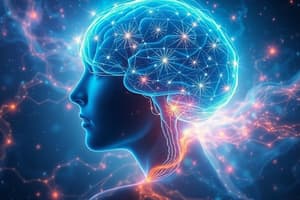Podcast
Questions and Answers
What is the primary purpose of studying according to the podcast?
What is the primary purpose of studying according to the podcast?
To offset forgetting and retain information.
How many different mechanisms of neuroplasticity are there?
How many different mechanisms of neuroplasticity are there?
Three mechanisms.
Which of the following is NOT a mechanism of neuroplasticity?
Which of the following is NOT a mechanism of neuroplasticity?
- Strengthening of connections
- Addition of new neurons
- Weakening of connections
- Destruction of neurons (correct)
The best students tend to study for more than five hours each day.
The best students tend to study for more than five hours each day.
What is a suggested method for improving focus and attention while studying?
What is a suggested method for improving focus and attention while studying?
What is the effect of sleep on neuroplasticity?
What is the effect of sleep on neuroplasticity?
What does the 'first night effect' refer to?
What does the 'first night effect' refer to?
What is meant by 'active engagement' in the context of learning?
What is meant by 'active engagement' in the context of learning?
According to the podcast, what should you do to minimize distractions while studying?
According to the podcast, what should you do to minimize distractions while studying?
When does the remodeling of neural connections occur?
When does the remodeling of neural connections occur?
What is a behavioral tool that can improve focus?
What is a behavioral tool that can improve focus?
Name three tools that the most effective students use.
Name three tools that the most effective students use.
Which group performed best in the studies comparing study methods?
Which group performed best in the studies comparing study methods?
What percentage improvement can be expected from testing yourself once on new material?
What percentage improvement can be expected from testing yourself once on new material?
Rereading material multiple times is more effective for learning than self-testing.
Rereading material multiple times is more effective for learning than self-testing.
The ability to focus and study is considered a ______.
The ability to focus and study is considered a ______.
What is the suggested best way to study for effective learning?
What is the suggested best way to study for effective learning?
What are Gap effects in learning?
What are Gap effects in learning?
How long can Gap effects last?
How long can Gap effects last?
Testing is solely for the purpose of evaluation and grading.
Testing is solely for the purpose of evaluation and grading.
Which factors enhance learning, according to the content?
Which factors enhance learning, according to the content?
What is 'one trial learning'?
What is 'one trial learning'?
What role do neuromodulators like epinephrine and norepinephrine play in learning?
What role do neuromodulators like epinephrine and norepinephrine play in learning?
What is interleaving in the context of learning?
What is interleaving in the context of learning?
What is the recommended practice after learning new material to enhance retention?
What is the recommended practice after learning new material to enhance retention?
How is mastery defined in the context of learning?
How is mastery defined in the context of learning?
Flashcards are hidden until you start studying
Study Notes
Learning & Neuroplasticity
- Learning is a process of change in the nervous system referred to as neuroplasticity.
- Neuroplasticity has three major mechanisms: strengthening of existing connections, weakening of existing connections, and neurogenesis (addition of new neurons).
- Neurogenesis primarily occurs in the olfactory bulb and dentate gyrus, but it's not the primary mechanism for learning and memory.
- Strengthening and weakening of existing connections between neurons are the main mechanisms of neuroplasticity.
- The removal or weakening of connections between neurons is essential for learning.
- Neuroplasticity and learning are a two-step process: active engagement and sleep.
Focus & Alertness
- Active engagement is crucial for learning; it involves focus and alertness on learning material.
- Focus and attention are key for initiating neuroplasticity.
- A good night's sleep before learning is crucial for optimal focus and attention.
- Sleep is the best "nootropic" for enhancing learning.
- Active engagement involves voluntary effort and mental strain, which is a sign of learning.
Periodic Testing & Studying
- Frequent periodic testing of learned material is essential for offsetting forgetting.
- The process of testing itself significantly contributes to learning and memory retention.
- The most successful students incorporate frequent self-testing into their study habits.
Tools for Enhancing Focus & Memory
- Mindfulness meditation (5-10 minutes per day) improves focus, memory, and recall.
- Perceptual exercises like focusing on a visual target and bringing your attention back to it helps improve mental focus.
- Non-sleep deep rest (NSDR) or Yoga Nidra (10-20 minutes) enhances neuroplasticity, especially when sleep is limited.
Study Habits of Successful Students
- Successful students set aside specific time for studying, free from distractions.
- They typically study alone for 3-4 hours per day, broken down into shorter sessions.
- They limit distractions, like phones, and inform others about their study time.
- Teaching peers the learned material significantly enhances learning and retention.
- "Watch one, do one, teach one" is an excellent strategy for learning and developing proficiency.
- The brain's attentional budget is limited but renewable, impacted by adenosine levels.
Scheduling Study Time
- Studying at regular times can improve focus and attendance
- The brain entrains to regular schedules similarly to its sleep-wake cycles
- Allocate at least two to three days to adjust to a new study schedule
- Minimize distractions during study sessions, consider turning off the phone or Wi-Fi
Motivation and Aspiration Goals
- Highly effective students often have a long-term understanding of how their success in school will impact their life
- Aspirational goals can provide motivation, especially when studying challenging material
Testing as a Learning Tool
- Testing oneself is a highly effective method for learning and retaining information, even more so than repeated reading.
- Studies show that testing oneself or being tested soon after exposure to new material helps offset forgetting.
- Testing allows you to identify knowledge gaps and focus your learning efforts.
Familiarity vs Mastery
- Being familiar with a concept doesn’t mean you understand or can recall it well enough to use it.
- Mastery requires a deeper understanding of the material and the ability to recall and use it in different contexts.
Self-Testing Improves Retention
- Self-testing, even if you get answers incorrect, promotes memory consolidation and reduces forgetting.
- Students often overestimate their knowledge, leading to poor performance on exams, since they are only used to familiarity with concepts.
- Self-testing can be individualized and tailored to your specific learning preferences.
Types of Self-Tests
- Open-ended questions, like short-answer or long-answer, are generally better for learning than multiple-choice questions.
- However, trick questions on multiple-choice tests, which require a deeper understanding of the material, do offer some learning benefits.
- Utilize quizzes to reinforce learning even if they don’t impact your final grade.
Timing of Self-Tests
- Testing oneself immediately, or soon after, exposure to new material significantly improves retention.
- The combination of familiarity through exposure and self-testing significantly enhances learning compared to simply re-reading the material.
Gap Effects in Learning
- The brain is constantly forgetting information, especially if not reinforced.
- Self-testing at regular intervals not only boosts knowledge retention but also offsets natural forgetting.
Self-Testing Mindset
- Embrace testing as a learning tool, not just an evaluation method.
- Actively test yourself on new material and identify knowledge gaps to optimize your learning.
- Use your phone strategically after learning to avoid forgetting.
- Recognize that testing itself is a form of studying and key to learning.
Gap Effects
- Short breaks during learning improve memory.
- These breaks allow the hippocampus to repeat information up to 20-30 times faster than normal.
- These breaks activate similar neural processes to those experienced during REM sleep.
Testing as a Form of Studying
- Testing is not just for evaluation, but for revealing what you know and don't know.
- Testing should be frequent and conducted soon after exposure to new material.
- Testing helps to identify learning gaps and allows for comparison with correct answers.
- There is a considerable body of research supporting testing as an effective learning tool.
Emotion & Learning
- Emotionally salient experiences are remembered more vividly and durably.
- This is the basis of PTSD, where a single traumatic experience leads to lasting memory formation.
- Stressful events trigger the release of hormones like adrenaline and epinephrine, which strengthen neural connections.
- The emotional component can be uncoupled from negative memories through therapy techniques like systematic exposure therapy and EMDR.
Story & Learning
- Stories and emotional emphasis enhance memory formation and consolidation.
- Positive or negative emotional experiences are more likely to be encoded in long-term memory.
- Teachers can use storytelling and emotional engagement to improve student retention.
Interleaving Information
- Interleaving new information with unrelated or semi-related information can improve learning, potentially due to increased neural repetitions and enhanced encoding processes.
- The brain is able to connect new information with existing knowledge through interleaving.
- This approach encourages flexibility and adaptability in learning.
The Stages of Learning
- Unskilled: Limited understanding and ability to utilize information.
- Skilled: Ability to recognize and use information in basic or advanced ways.
- Mastery: Comprehensive knowledge in a given domain and flexible application.
- Virtuosity: High level of mastery that allows for spontaneous and unique application of knowledge, often exceeding expectations.
Neuroplasticity & Learning
- Neuroplasticity, the brain's ability to change and adapt, is vital for learning and memory.
- The brain's neural circuits are modified through experience and learning.
- Techniques like deliberate cold exposure and caffeine consumption, can enhance cognitive function and improve learning.
- Caffeine increases epinephrine levels, which can improve alertness and learning.
Key Components of Effective Learning
- Alertness: A state of heightened awareness that facilitates attention to the material.
- Testing: Regularly assessing your knowledge to identify gaps and strengthen understanding.
- Sleep: Adequate sleep is essential for memory consolidation and brain function.
- NSDR (Neuro-Somatic Deep Relaxation) is recommended
- Interleaving: Incorporating unrelated information or anecdotes into your learning routine, to enhance encoding and retention.
Studying That Suits You
Use AI to generate personalized quizzes and flashcards to suit your learning preferences.



